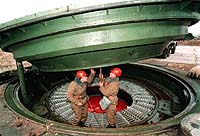| . |  |
. |
Moscow (AFP) Dec 10, 2009 Russia's new nuclear-capable missile suffered another failed test launch, the defence ministry said Thursday, solving the mystery of a spectacular plume of white light that appeared over Norway. The Bulava missile was test-fired from the submarine Dmitry Donskoi in the White Sea early Wednesday but failed at the third stage, the defence ministry said in a statement. The pre-dawn morning launch coincided with the appearance of an extraordinary light over northern Norway that captivated observers. Images of the light that appeared in the sky above the Norwegian city of Tromso and elsewhere prompted explanations ranging from a meteor, northern lights, a failed missile or even a UFO. Describing the latest failure of the Bulava as a major embarrassment for the military, leading Russian defence analyst Pavel Felgenhauer said the images were consistent with a missile failure. "Such lights and clouds appear from time to time when a missile fails in the upper layers of the atmosphere and have been reported before," he told AFP. "At least this failed test made some nice fireworks for the Norwegians," he joked. The White Sea, which is the usual site for such missile tests by Russian submarines, lies close to Norway's own Arctic region. This was the 12th test launch of the Bulava and the seventh time the firing has ended in failure, the Interfax news agency said. The submarine-launched missile is central to Russia's plan to revamp its ageing weapons arsenal but is beset by development problems. "The first two stages of the rocket worked but in the final and third stage there was a technical failure," the defence ministry said in a statement. The statement said the problem was with the engine in the third stage, while in past launches the first stage had been faulty. The problems with the Bulava have become an agonising issue for the defence ministry, which has ploughed a large proportion of its procurement budget into ensuring the missile becomes the key element of its rocket forces. The previous failure in July forced the resignation of Yury Solomonov, the director of the Moscow Institute of Thermal Technology which is responsible for developing the missile. Felgenhauer said that it had dealt a serious blow to Russia's bid to maintain a credible nuclear deterrent. "By the year 2030, Russia could lose its position as a global nuclear power if the problems are not solved. And it could be that these missiles will never fly properly. "The Russian defence industry has disintegrated to such an extent that it simply cannot make such a complicated system work. Technology and expertise have been lost," he said. The problems are also a major political embarrassment, coming as Russia negotiates with the United States the parameters of a new arms reduction treaty to replace the 1991 START accord. The treaty expired on December 5, and despite intense negotiations the two sides have yet to agree the text of a new deal. In a separate development, a successful test-firing took place of Russia's intercontinental surface-to-surface ballistic missile Topol RS-12M, news agencies quoted a statement from the strategic rocket forces as saying. The missile -- introduced to the rocket forces before the fall of the Soviet Union -- was fired from the southern Russian region of Astrakhan and hit its target at a testing range in neighbouring Kazakhstan. The Bulava, which can be equipped with up to 10 individually targeted nuclear warheads, has a maximum range of 8,000 kilometres (5,000 miles). It is the sea-based version of the Topol-M, Russia's new surface-to-surface intercontinental missile, and designed to be launched from Moscow's newest Borei class of submarines. Defence analysts say that a further headache for the military is that the new submarines are designed to be compatible with Bulava and if the new missile fails to work the vessels will be virtually useless. Share This Article With Planet Earth
Related Links Learn about nuclear weapons doctrine and defense at SpaceWar.com Learn about missile defense at SpaceWar.com All about missiles at SpaceWar.com Learn about the Superpowers of the 21st Century at SpaceWar.com
 US treaty inspections to end at Russia missile plant: report
US treaty inspections to end at Russia missile plant: reportMoscow (AFP) Dec 1, 2009 US arms inspectors must end their almost 15-year monitoring of Russia's main missile plant this week, as the key US-Russia nuclear treaty expires, a Russian military-diplomatic source said Tuesday. Under the old Strategic Arms Reduction Treaty, or START, up to 30 US experts monitored traffic to and from Russia's foremost missile factory in the remote village of Votkinsk, about 580 kilometres ... read more |
|
| The content herein, unless otherwise known to be public domain, are Copyright 1995-2009 - SpaceDaily. AFP and UPI Wire Stories are copyright Agence France-Presse and United Press International. ESA Portal Reports are copyright European Space Agency. All NASA sourced material is public domain. Additional copyrights may apply in whole or part to other bona fide parties. Advertising does not imply endorsement,agreement or approval of any opinions, statements or information provided by SpaceDaily on any Web page published or hosted by SpaceDaily. Privacy Statement |